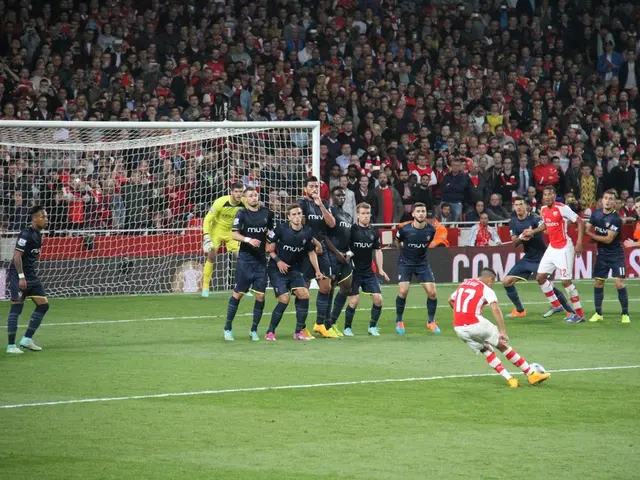Inter Milan's Financial Woes: From Chinese Ownership to American Rescue
struggling financially yet ascending:exploring how Inter managed to advance to Champions League semis amidst massive debts
Last year, Inter Milan secured the Italian championship for the 20th time, sending fans into a frenzy of black and blue. But behind the scenes, a significant shift was underway. The club's Chinese owners, Suning Holdings, were forced to hand over control to American global investment firm, Oaktree Capital Management, due to substantial debts.
Suning had owned the three-time European Cup winners since 2016. Led by Steven Zhang, whose net worth was then estimated at $6 billion, Suning spent over €800 million on the club. However, the pandemic-induced crisis erased all these investments. In 2021, Suning was forced to take a €295 million emergency loan from Oaktree, which increased to €395 million over three years.
Reaching the 2023 Champions League final did little to improve Inter's financial standing. The Chinese side attempted to restructure its debt, but Oaktree refused to extend the credit line until 2027. Suning then held talks to sell its stake to American investment fund PIMCO, as well as a Saudi Arabian family linked to the state investment fund PIF. Yet, Oaktree blocked all potential deals.
"For months, we've done everything possible to find a amicable solution with Oaktree," Zhang lamented. "Unfortunately, all our efforts were thwarted by legal threats and a lack of substantial cooperation from Oaktree. This situation poses a significant risk to the club's stability."
Zhang's Questionable Ventures
Zhang's fortune was once made in retail, but his questionable investments, such as Evergrande's bankrupt stocks worth $300 billion in 2021, and several other failed projects led to his downfall. Eventually, Suning itself declared financial collapse at the start of this year.
Inter and its long-time rival, Milan, share more than just the San Siro stadium and fierce competition. Both clubs have undergone similar changes of ownership. In 2018, Milan's Chinese owner Li Yonghong failed to repay a €32 million debt to Elliott Management. Four years later, Elliott sold Milan to American investment company RedBird Capital Partners for €1.2 billion. Oaktree now aims for a similar deal with Inter, but first, they need to improve the club's financial health.
Inter's Mountainous Debt
Inter and several other top Italian clubs struggle with enormous debts, totaling €3.2 billion. Inter's debt stood at €734.8 million as of June 30, 2024, down from €807 million the previous year. Inter's main revenue streams are TV broadcasting deals, commercial agreements, and matchday revenues. Despite these enormous debts, Italian clubs pale in comparison to other leading European clubs in terms of revenue.
A Squad With Sky-High Costs
One of Inter's main issues is its highest wage bill among all Serie A teams at €206 million. This includes expenses for the first team players, youth divisions, coaching staff, and technical personnel. Other top spenders in the Italian championship are Juventus (€200 million), Milan (€163 million), Roma (€160 million), and Atalanta (€106 million). Napoli, the current scudetto candidate, spends €104 million.
By 2027, Inter Aims to Shed Its Debt
Inter's squad value, calculated by Football Benchmark, is the highest in Italy at €709 million, compared to €684 million for Milan and €647 million for Juventus. The new management aims to reduce squad costs, but this has not been very successful so far. The champions spent €186 million on wages in the 2023/24 season. The highest earner is captain and main striker Lautaro Martinez (€16.6 million per year).
In the summer transfer window, the club plans to significantly rejuvenate the team, which is the oldest in Serie A (29.1 years), by parting ways with some veteran players and focusing on younger, more affordable talent.
A New Era Under Oaktree
"We've invested little in the squad, signing free agents," said Giuseppe Marotta, Inter's general director, to La Stampa. "We have plans to return to big investments, but this doesn't mean replacing 12 players. Primarily, it means rejuvenating the squad, which is achieved through investments. Oaktree has given us this opportunity. We also plan to create a U-23 team that will compete in Serie C."
The exit from the financial crisis could be facilitated by successful performances of Inter in the current Champions League – the Milanese side has already reached the semi-finals. However, the main progress in this direction is still linked to Oaktree's Spring 2025 plan for the repayment of the main part of Inter's debt – bond debt. It amounts to €403.9 million, and Oaktree intends to close this debt by February 9, 2027.
"Oaktree believes they can significantly increase the value of the asset in the coming years," says Marco Bellinazzo, an expert in football finance. "The goal is to sell Inter for the highest profit, approximately €2-2.5 billion."
- Having faced legal threats and lack of cooperation from Oaktree, Steven Zhang, the former owner of Inter Milan and a retail tycoon, expressed concern about the club's stability due to the ongoing financial crisis.
- In 2024, Inter's debt stood at €734.8 million, a decrease from the previous year's €807 million, with TV broadcasting deals, commercial agreements, and matchday revenues being its main sources of income.
- Inter's wage bill, the highest among all Serie A teams, amounted to €206 million in 2024, covering expenses for first team players, youth divisions, coaching staff, and technical personnel.
- Despite Inter's enormous debts, its squad value is the highest in Italy, at €709 million, compared to €684 million for Milan and €647 million for Juventus.
- In an effort to rejuvenate the team, Inter plans to part ways with some veteran players and focus on younger, more affordable talent in the summer transfer window.
- Oaktree Capital Management aims to improve Inter's financial health and eventually sell the club for a profit estimated to be between €2-2.5 billion.
- In the football industry, questions arise about Zhang's previous investments, including bankrupt Evergrande stocks worth $300 billion in 2021, which contributed to his downfall and Suning's financial collapse.
- The successful performance of Inter in the ongoing Champions League could potentially expedite the club's exit from the financial crisis, with Oaktree's Spring 2025 plan for the repayment of the main part of Inter's debt, worth €403.9 million, linked to the club's progress in the tournament.








